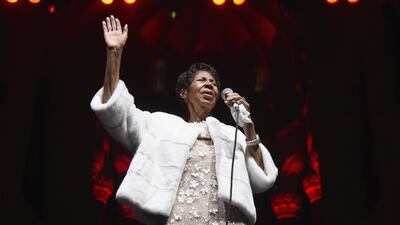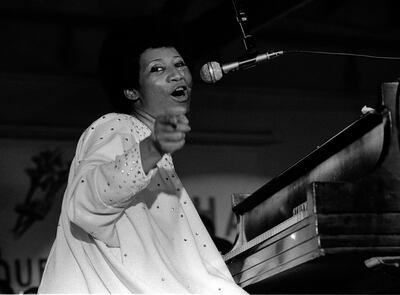Ranked No 1 in Rolling Stone magazine's list of the 100 Greatest Singers Of All Time, Aretha Franklin is perhaps the ultimate voice of experience. Now 75, she lost her mother at 10, but was clearly blessed with a preternatural talent and an indomitable spirit. How else to explain the Memphis, Tennessee-born star's 20 American No 1 singles, her jaw-dropping performance of Nessun Dorma while standing-in for Luciano Pavarotti at the 1998 Grammys, and her still uncontested Queen Of Soul sobriquet?
Franklin's latest makeover comes courtesy of record producers Nick Patrick and Don Reedman, the brains behind A Brand New Me: Aretha Franklin With The Royal Philharmonic Orchestra. Recorded at Abbey Road in London, showcasing Aretha as you have never quite heard her before, it is a fascinating piece of work that is bound to court controversy.
The album showcases the latest advances in a technique which Patrick and Reedman also used when making 2015's If I Can Dream, which paired archival Elvis Presley vocal recordings with newly recorded arrangements performed by London's Royal Philharmonic, 38 years after the singer's death.
That record has since sold 1.6 million copies, establishing a clear demand for such sonic prestidigitation. But Brand New Me – which builds new orchestrations, backing vocals and in some cases band arrangements around original vocal performances Franklin cut for Atlantic Records in the late 1960s while in her 20s – is a whole other animal, largely because Franklin is still very much alive.
Talking with Patrick and Reedman, one feels assured that they go about their restorative/transformative work with due reverence and care, but they also know that some Franklin aficionados might find their delicate, if impressive, rebooting of some of the singer's revered back-pages sacrilegious.
“We’re not saying this is better,” Patrick says when asked about the ethics of the project. “We’re saying this is different. If you want to listen to the originals, that’s wonderful – keep doing so, but give this record a chance, too. It’s a highly respectful enhancement of music by one of the greatest artists who ever lived.”
"We didn't rip [Franklin's] voice off the recordings and say: 'Oh, we're going to something bigger and better than you ever did'," Reedman adds. "The whole reason these new recordings work is because they have a heart and soul that was laid down during the original sessions, and we build upon that foundation. It's like having a beautiful old classic car: you don't change the headlights - you have them re-chromed. That's what we do – and with a great love and sympathy for the original art form."
Patrick says that their work on Franklin's music required a different sensibility to that of the Elvis project, largely because Franklin's music is so much about how it makes you feel. Consequently, A Brand New Me is much less grandiose and symphonic than If I Can Dream, with all parties concerned working to try to maintain the inherent soulfulness of Franklin's music. Given that the multi-track master tapes of the Franklin songs Patrick and Reedman were working on were destroyed in a fire in the 1970s, they also faced the huge challenge of extracting Franklin's vocals from mixes that had already been bounced down into a blend of vocals and instrumentation.
Recent technological advances made this just about possible, but they nonetheless opted to retain certain parts of the original arrangements, these elements and the newly-recorded ones mapping like two sides of the same, freshly minted coin.
Franklin's Atlantic Records back catalogue is currently owned by Warner Bros, and this, Patrick says, meant that their access to it and subsequent makeover could proceed "relatively unencumbered". But what of the great woman herself and the all-important question? Is Franklin down with the project?
“Well, the feedback we’ve had via her representatives has been very positive,” Reedman says. “Aretha loved the idea of us taking these old recordings she made so many years ago and breathing new life into them. She’s taken it as a compliment, which was very, very important to us.”
Reedman says that Franklin was especially pleased with the producers' choice of songs on A Brand New Me, which includes material of great personal significance to Franklin, as well as famed hits such as Respect and Son Of A Preacher Man.
"We've got stuff like Angel, which was co-written by Aretha's sister Carolyn [with Sonny Saunders], and her version of Let It Be. Those are songs where she was really tapping into her gospel roots, the church background that she came from, and you can tell that she really wanted to sing them.
“It’s also important to mention Aretha’s piano playing, and the way it complements her voice, because she has this amazing musical foundation from the piano up. When we were listening back to the original recordings, there were so many spine-tingling moments.”
“Yes, when we were doing the new recordings the orchestral players were in seventh heaven,” Patrick adds. “When you’re often playing light classics, very nice though they are, and suddenly you have Aretha Franklin in your headphones and you’re playing along with her… well, it was hugely inspirational for them.”
Another point in A Brand New Me's favour is that it will likely bring Franklin's music to a whole new audience. Younger ears are used to digitised sound; albums as algorithms – and Patrick argues that the album has "the sonic perception of being brand new, but retains all the emotional impact of being original". The second half of that statement is a moot point, but it is undoubtedly a joy to hear a twentysomething Franklin sing I Say A Little Prayer flanked by an able orchestra recorded with 21st-century clarity.
What is perhaps missing, though, is a certain grit and the sense of Franklin and her cohorts creating magic in the moment back in time. And all of that is there instantly the moment one plays one of Franklin's original recordings for Atlantic.
It is to Patrick and Reedman’s credit, though, that the newly recorded backing vocals on the album were led by Patti Austin, a woman who has worked with Franklin, knows her music intimately and comes from the same gospel music background.
Similarly, when it came to conducting and arranging the album's fine version of (You Make Me Feel Like) A Natural Woman, the producers were astute enough to employ Chris Walden, who was musical director when Franklin performed the song in honour of its writer Carole King at The Kennedy Centre in Washington in 2015.
With Franklin having performed live as recently as earlier this month, Patrick and Reedman are hopeful that she might play some concerts with the Royal Philharmonic in support of A Brand New Me, though Reedman cautions: "We're not holding our breath."
“If it were to happen, it would probably be four or five extremely prestigious shows rather than a concert tour,” Patrick adds. “Can you imagine? I think it would be a magnificent celebration of an extraordinary career.”
A Brand New Me: Aretha Franklin with the Royal Philharmonic Orchestra is out now
_______________________
Read more from music:
Experiencing U2 for the 14th time with new album Songs of Experience
R'n'B singer Beth Griffith on learning from legends
Liam Gallagher: a life in rock'n'roll
_______________________


